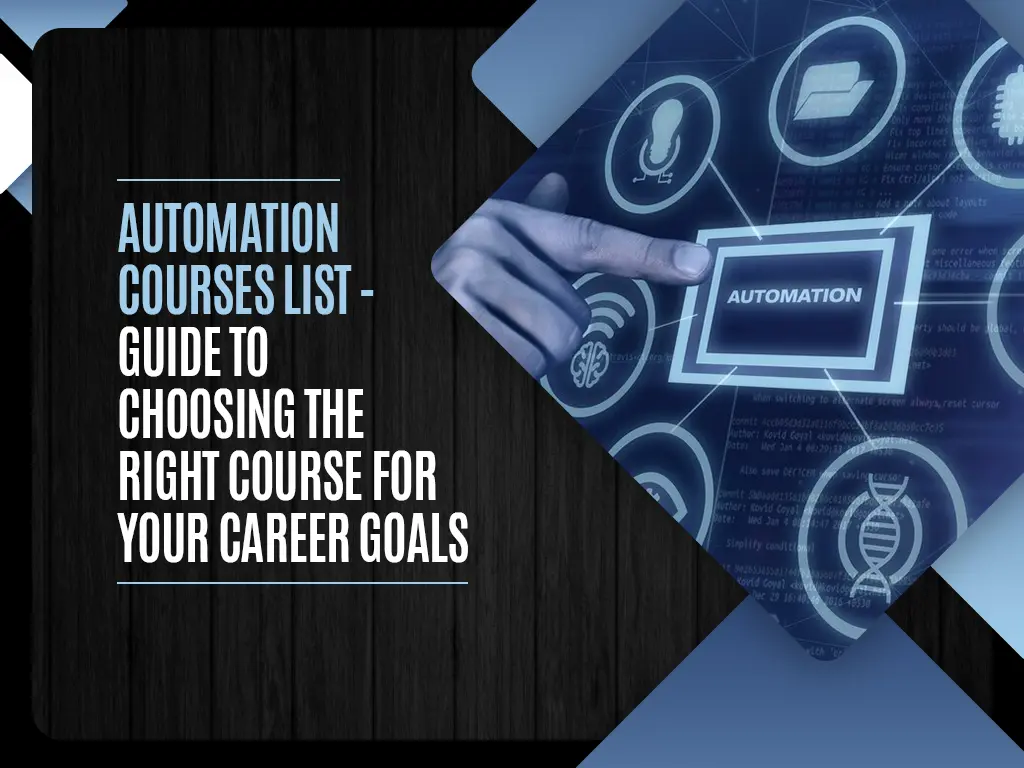Automation Courses List – Guide To Choosing The Right course For Your Career Goal
Automation is revolutionizing various industries by streamlining processes and reducing human effort and errors.

Automation is revolutionizing various industries by streamlining processes and reducing human effort and errors. As a result, there is a huge demand for professionals with automation skills. However, with so many automation courses available, it can be difficult to choose the right one based on your interests and career goals. This article provides a comprehensive guide to automation courses list and help you select the most suitable one.
Robotics And IoT Courses
Robotics and IoT are two of the most in-demand and fast-growing fields in automation. Courses in these areas impart a variety of technical skills that are required to design, build and program automated devices. Robotics Engineering teaches mechanical design, electronics, programming and control of industrial robots. IoT and Embedded Systems develops the ability to create connected devices using sensors, microcontrollers and cloud platforms. Mechatronics provides a multidisciplinary education in mechanics, electronics, software and control engineering to develop automated mechatronic machines. Drone Technology equips students with aeronautics, computer vision and programming expertise needed for commercial drone applications. These courses open up exciting career opportunities in robotics, IoT, automation and related sectors.
Engineering jobs in the fields of Robotics and IoT are among the most sought-after and rapidly expanding areas in automation, offering exciting career opportunities through courses that teach mechanical design, electronics, programming, control systems, and the creation of connected devices using sensors, microcontrollers, and cloud platforms.
Courses In Automation Programming
Courses in Automation Programming focus on developing crucial coding skills that are essential for controlling automated systems and machinery. Some key courses include PLC and SCADA Programming which teaches using Programmable Logic Controllers and SCADA systems to regulate industrial equipment and processes. Machine Vision Programming imparts techniques to program automated quality inspection using computer vision and imaging. Robot Programming equips students with languages for developing robot applications in areas such as materials handling and assembly lines. Additionally, HMI and MES Programming develops the ability to code Human-Machine Interfaces and Manufacturing Execution Systems to oversee automated plant operations on the production floor. Mastering these in-demand programming skills opens up exciting job prospects in automating industrial control and production.
Courses In Automation Testing
Automation testing courses teach skills to automate software testing processes using programming and tools, in order to test applications and systems quickly and efficiently. The Automation Testing Fundamentals course provides an introduction to the concepts of test automation including frameworks, programming basics, test planning and defect tracking. The Selenium Automation Testing course focuses on teaching the popular Selenium tool to automate testing of web applications using Java and Python. Mobile App Testing imparts skills to test Android and iOS mobile apps automatically using Appium and Calabash. API Testing equips students to programmatically test APIs built with REST and SOAP using tools. These courses produce test automation engineers for roles in web, mobile and API testing.
Conclusion
This article provided an overview of the wide range of automation course list available and factors to consider while choosing one based on your interests and career goals of certifications in automation testing. Courses in fields like robotics, IoT, programming, testing and data analytics open doors to exciting and in-demand roles in automation. Choosing the right course is the first step to a successful career in this booming industry.



